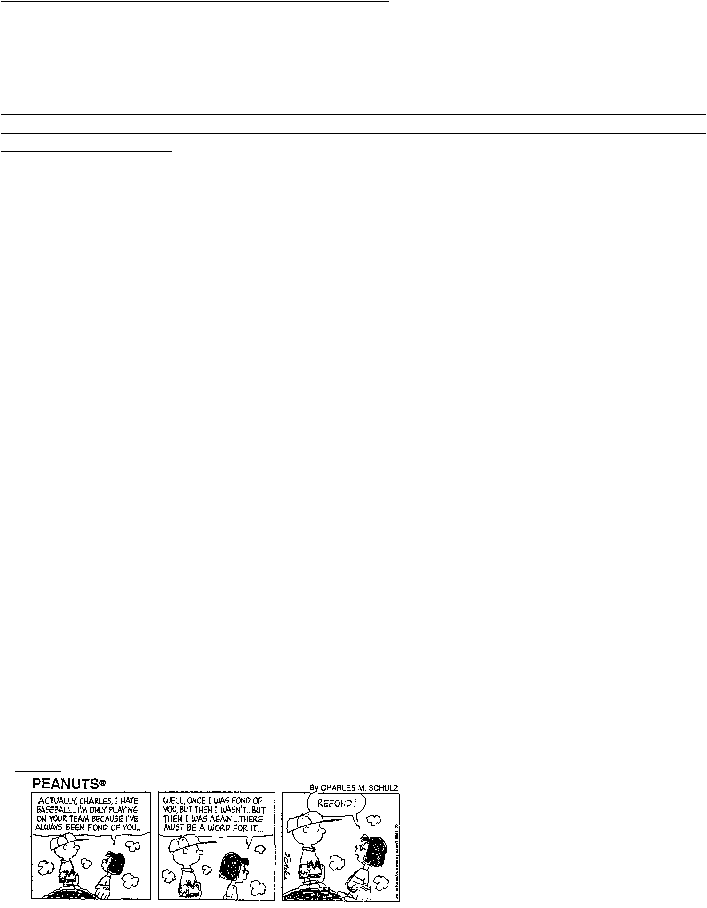
6
Summer, 1959, also quoted in The Annotated Alice fp.2701)
«May we ... make our words mean what we choose them to mean? One thinks of a Soviet delegate using
"democracy" in a U.N. debate. May we «pay our words extra,» or is this the stuff that propaganda is made of?
Do we have an obligation to past usage? In one sense words are our masters, or communication would be
impossible. In another we are the masters; otherwise there could be no poetry.»
Text D. (from «Words,on Words,» the acceptance speech delivered by Vaclav Havel, on receiving the Peace
Prize of the German Booksellers Association on October 15,1989; reprinted in «The New York Review of
Books,» January 18, 1990)
(1) Words can have histories too.
(2) There was a time, for instance, when, for whole generations of the downtrodden and oppressed, the word
socialism was a mesmerizing synonym for a just world, a time when, for the ideal expressed in that word,
people were capable of sacrificing years and years of their lives, and their very lives even. I don't know about
your country, but in mine, that particular word — «socialism» — was transformed long ago into just an
ordinary truncheon used by certain cynical, parvenu bureauc rats to bludgeon their liberal-minded fellow
citizens from morning until night, labeling them «enemies of socialism» and «antisocialism forces.» It's a fact:
in my country, for ages now, that word has been no more than an incantation that should be avoided if one does
not wish to appear suspect.
(3) I was recently at an entirely spontaneous demonstration ...protesting the sell-off of one of the most
beautiful parts of Prague to some Australian millionaires. When one of the speakers there, loudly decrying the
project, sought to bolster his appeal to the government by declaring that he was fighting for his home in the
name of socialism, the crowd started to laugh. Not because they had anything against a just social order, but
quite simply because they heard a word which has been in-canted for years and years in every possible and
impossible context by a regime that only knows how to manipulate and humiliate people.
(4) What a weird fate can befall certain words! At one moment in history, courageous, liberal-minded people
can be thrown into prison because a particular word means something to them, and at another moment, people
of the selfsame variety can be thrown into prison because that word has ceased to mean anything to them,
because it has changed from a symbol of a better world into the mumbo jumbo of a doltish dictator.
(5) No word — at least not in the rather metaphorical sense I am employing the word «word» here —
comprises only the meaning assigned to it by an etymological dictionary. The meaning of every word also
reflects the person who utters it, the situation in which it is uttered, and the reason for its utterance. The
selfsame word can, at one moment, radiate great hopes, at another, it can emit lethal rays. The selfsame word
can be true at one moment and false the next, at one moment illuminating, at another, deceptive. On one
occasion it can open up glorious horizons, on another, it can lay down the tracks to an entire archipelago of
concentration camps. The selfsame word can at one time be the cornerstone of peace, while at another,
machine-gun fire resounds in its every syllable.
(6) Gorbachev wants to save socialism through the market economy and free speech, while Li Peng protects
socialism by massacring students, and Ceausescu by bulldozing his people. What does that word actually mean
on the lips of the one and 50 the lips of the other two? What is this mysterious thing — [«socialism»] — that is
being rescued in such disparate ways?
Text E.
Exercises:
I . In text (C) above, Roger W. Holmes asks: «May we... make our words mean what we choose them to
mean?»
1. How does Holmes himself answer this?

